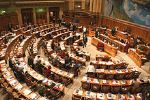Vested interests in Swiss aid
Published on Fri, 2016-05-20 17:59
A few weeks ago the Finance Committee of the National Council moved for Switzerland's official development assistance to be reduced to 0.4% or even 0.3% of gross national income over the coming years. That would mean cutting expenditure on actual development cooperation abroad by 30% to 50%. Care of asylum seekers here at home, which Switzerland absurdly counts as development spending, would then account for one fourth to one third of this expenditure. In the National Council itself, the Finance Committee's radical cost-cutting proposals will hardly find a majority. It transpires from centre-right circles, however, that a call will indeed be made for cost-cutting in long-term development programmes in order to release more funds for short-term emergency humanitarian aid. The call will also be for development cooperation to be more closely tied to Switzerland's own interests, namely to migration partnerships and agreements for the repatriation of asylum seekers. The stated purpose of these demands is to provide "on-site assistance". What this means, however, is assistance for a Switzerland that is keen to prevent people in need from migrating, or to return them quickly to their country of origin. This is in clear contradiction of the statutory purpose of development cooperation, which is to help people in less well-off countries to improve their living conditions through solidarity. At the same time, the measures being requested fail to include the intention to alleviate migratory pressures. Calling for funds to be transferred from long-term development programmes to emergency humanitarian aid is preaching to the converted. In its Dispatch on International Cooperation 2017-20, the Federal Council is already calling for increased humanitarian aid. In so doing, it is also reserving for itself the possibility, if necessary, to spend a further 120 million francs for short-term emergency operations. Those funds are expected to come from the already drastically reduced budget for long-term bilateral development programmes. The planned reallocation of funds would be extremely short-sighted, however. Switzerland would lack the funds for reconstruction work after an emergency operation and it would be less than ever in a position to invest preventively in the avoidance of new crises. It would have to stand by helplessly as new conflicts begin outside the current crisis areas. It would be no less short-sighted to tie development cooperation to migration issues. Politically motivated support, in other words, swapping "development aid for migration agreements" risks having the exact opposite of the intended effect. Regimes such as that in Eritrea would save themselves their own development costs and use the funds thus released to strengthen their own grip on power. This would not tackle but instead exacerbate the reasons currently causing people to flee. Good development cooperation functions differently: it improves living conditions in the partner country by strengthening its civil society and empowering it to hold at the State accountable for meaningful policies. This generally rules out a political deal between the donor country and the recipient government. Comments by Mark Herkenrath, Director Alliance Sud. Source: Alliance Sud. |
SUSCRIBE TO OUR NEWSLETTER



